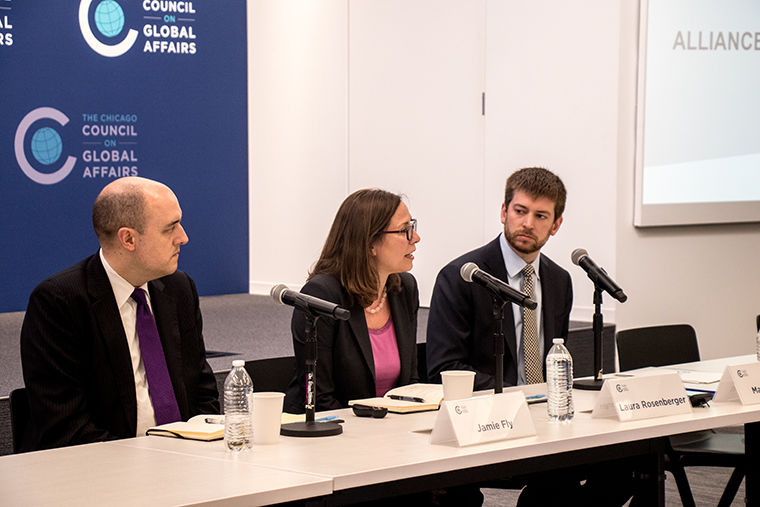Experts say Russia attack on US democracy targeted weaknesses
The Chicago Council on Global Affairs held a forum to discuss “securing democracy” at One Prudential Plaza, 130 E. Randolph St., on April 25. The panelists were co-directors of The Alliance for Securing Democracy and Senior Fellows for The German Marshall Fund of the United States Jamie Fly and Laura Rosenberger. The panel was led by the Director of Government and Diplomatic Programs at The Chicago Council on Global Affairs Matt Abbott.
April 30, 2018
After investigations found that Russian intelligence interfered in the 2016 presidential election in various capacities, experts say the attack on U.S. democracy targeted domestic vulnerabilities.
In an April 25 panel hosted by The Chicago Council on Global Affairs, 130 E. Randolph St., called “Securing Democracy,” Jamie Fly and Laura Rosenberger from the Alliance for Securing Democracy and the German Marshall Fund of the United States, explained that this is not the first time Russian President Vladimir Putin has attempted to undermine democracy.
Using social media platforms, Fly and Rosenberger said U.S. citizens received disinformation in an effort to undermine faith and confidence in one of the country’s most fundamental right: the ability to choose their own leaders.
Rosenberger, a former foreign policy adviser for Hillary Clinton, said Russia previously used cyber attacks to influence Brexit in the U.K., as well as the recent France and German elections. Fly called the U.S. interference by Russians “a bipartisan failure to listen to our allies in Europe who have experienced the same interference.”
“This has been part of an effort undertaken by Russia to undermine democracies across the transatlantic space,” Rosenberger said. “It’s not just about elections. We see real attacks on the pillars of democracy.”
The Alliance for Securing Democracy is currently using a social media dashboard called Hamilton 68 to monitor more than 600 Russian accounts that create propaganda and false information online, according to Fly, who is a former counselor for Foreign and National Security Affairs to U.S. Sen. Marco Rubio.
Hamilton 68 is named after the Federalist Papers No. 68, in which Alexander Hamilton wrote about protecting America’s electoral process from foreign meddling. Contrary to popular belief, Fly said Hamilton 68 tracks accounts that not only push messages to obstruct elections, but ones that also interfere with domestic debates.
In an attempt to weaken others to gain relative power, Putin has identified and exploited U.S. vulnerabilities, such as free speech, open access information and technology systems, Rosenberger said. The challenge arises to combat these issues without losing freedoms, she added.
“These strengths are what make our democracy so thriving, but at the same time, we need to make sure that it’s not used against us,” Rosenberger said.
Race, immigration and the criminal justice system are domestic debates being manipulated from thousands of miles away, Rosenberger added. Russia is using U.S. vulnerabilities to their advantage by pitting Americans against each other and instilling distrust in government, Fly said.
Apryl Eshelman, a fundraiser for a local nonprofit that focuses on international issues, said the bipartisan attempt of the Alliance for Securing Democracy to address external threats is a good start. However, she added that internal threats such as voter suppression and the National Rifle Association’s campaign funding also need more attention.
“It’s a vicious cycle where our internal issues are creating vulnerabilities for foreign entities to manipulate,” Eshelman said.
Rosenberger said there are multiple steps to combat Russian interference: learn from other democracies on how to better defend and deter activity, close off vulnerabilities in the U.S. by healing social division and reducing partisanship, and take steps to better secure voting and election infrastructure while strengthening the news media environment.
“The best way to respond to these challenges is to shine a light on them and raise awareness,” Fly said. “When you have informed citizenry, it is much more likely that they may not actually respond to certain messages that are pushed or influences that are made [by foreign entities]. The government cannot solve this alone, at the end of the day, it is incumbent upon the American citizens to be smarter consumers of news and information and more active participants in their democracy.”








